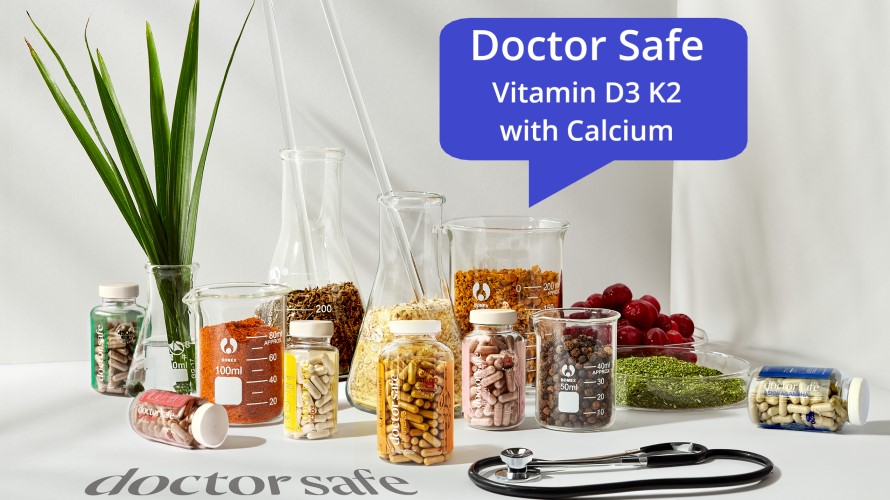Local Storage seems to be disabled in your browser.
For the best experience on our site, be sure to turn on Local Storage in your browser.
Boost Your Bone and Cardiovascular Health
Browse All Tags

Looking to boost your bone and cardiovascular health? Vitamin K2 might just be the supplement you need! With its powerful properties, this vitamin can help keep your body strong and healthy. So why wait? Start taking Vitamin K2 today and feel the difference!
Our Doctor Safe Vitamin D3 + K2 supplement is specially formulated to support your bone and heart health. Each serving contains 5000 IU of vitamin D3, 100 mcg of vitamin K2 (as MK-7), and 250 mg of calcium. We've also included BioPerine, a patented black pepper extract to ensure optimal absorption.
The benefits of taking this supplement include:
- Supporting bone health. Vitamin D3 and K2 are essential for bone health. Vitamin D3 helps the body absorb calcium, and vitamin K2 helps the body move calcium to where it is needed most, such as the bones. Calcium is also important for strong bones.
- Promoting heart health. Vitamin K2 helps to keep calcium out of the arteries, where it can build up and cause heart disease. It also helps to keep blood clots from forming.
- Boosting the immune system. Vitamin D3 plays a role in the immune system. It helps the body fight off infection.
- Maintaining muscle function. Calcium is important for muscle function. It helps the muscles contract and relax.
- We are providing energy. Vitamin D3 helps the body convert food into energy.
This supplement is made in the USA and is non-GMO, gluten-free, and easy to swallow. It is recommended to take one capsule daily with food.
It is important to talk to your doctor before taking any dietary supplements, especially if you are pregnant, breastfeeding, or have any underlying health conditions.
Here are some additional things to keep in mind when taking this supplement:
- The recommended daily intake of vitamin D3 is 600 IU for adults up to age 70 and 800 IU for adults over age 70.
- The recommended daily intake of vitamin K2 is 100-200 mcg.
- The recommended daily intake of calcium is 1000 mg for adults up to age 50 and 1200 mg for adults over age 50.
If you are taking other medications, talk to your doctor about the potential for interactions.
Vitamin D3 Benefits
Vitamin D3 is a fat-soluble vitamin that is important for many bodily functions, including:
- Bone health. Vitamin D3 helps the body absorb calcium, which is essential for strong bones. It also helps to prevent bone loss, a condition that can lead to osteoporosis.
- Immune function. Vitamin D3 plays a role in the immune system. It helps the body fight off infection and disease.
- Heart health. Vitamin D3 may help to reduce the risk of heart disease by lowering blood pressure and cholesterol levels.
- Mental health. Vitamin D3 may help to improve mood and cognitive function.
- Cancer prevention. Some studies suggest that vitamin D3 may help to protect against certain types of cancer, such as breast cancer and colon cancer.
- Muscle function. Vitamin D3 is important for muscle function. It helps the muscles contract and relax.
- Weight loss. Some studies suggest that vitamin D3 may help with weight loss by increasing the body's metabolism.
The recommended daily intake of vitamin D3 is 600 IU for adults up to age 70 and 800 IU for adults over age 70. However, some people may need more vitamin D3, depending on their individual circumstances. It is important to talk to your doctor to determine how much vitamin D3 you need.
You can get vitamin D3 from food, supplements, and sunlight. Good sources of vitamin D3 in food include fatty fish, such as salmon, tuna, and mackerel; egg yolks; and fortified milk and orange juice. You can also get vitamin D3 from supplements.
Sunlight is a natural source of vitamin D3. However, it is important to note that too much sun exposure can be harmful. The best way to get vitamin D from the sun is to expose your skin to sunlight for 10-15 minutes a day, several times a week, before 10 a.m. or after 4 p.m.
If you are concerned about your vitamin D levels, talk to your doctor. They can recommend a blood test to check your levels and determine if you need to take a supplement.
Here are some additional things to keep in mind about vitamin D3:
- Vitamin D3 is not stored in the body very well, so it is important to get it regularly.
- Vitamin D3 can interact with some medications, so be sure to talk to your doctor if you are taking any medications.
- Taking too much vitamin D can be harmful. The upper limit for adults is 4,000 IU per day.
Vitamin D3 Side Effects
Vitamin D3 is generally safe when taken in recommended amounts. However, taking too much vitamin D3 can be harmful and can lead to side effects such as:
- High calcium levels. Vitamin D helps the body absorb calcium, so taking too much vitamin D can lead to high levels of calcium in the blood. This can cause symptoms such as nausea, vomiting, constipation, and fatigue.
- Kidney stones. High levels of calcium in the blood can also increase the risk of kidney stones.
- Heart problems. High levels of calcium in the blood can also increase the risk of heart problems such as heart arrhythmia and heart attack.
- Mental health problems. Some studies have shown that taking too much vitamin D3 can lead to mental health problems such as depression and anxiety.
- Muscle weakness. Taking too much vitamin D3 can also lead to muscle weakness.
If you experience any of these side effects, stop taking vitamin D3 and talk to your doctor.
The recommended daily intake (RDI) of vitamin D3 for adults is 600 IU. However, some people may need more vitamin D3, depending on their individual circumstances. It is important to talk to your doctor to determine how much vitamin D3 you need.
You can get vitamin D3 from food, supplements, and sunlight. Good sources of vitamin D3 in food include fatty fish, such as salmon, tuna, and mackerel; egg yolks; and fortified milk and orange juice. You can also get vitamin D3 from supplements.
Sunlight is a natural source of vitamin D3. However, it is important to note that too much sun exposure can be harmful. The best way to get vitamin D from the sun is to expose your skin to sunlight for 10-15 minutes a day, several times a week, before 10 a.m. or after 4 p.m.
If you are concerned about your vitamin D levels, talk to your doctor. They can recommend a blood test to check your levels and determine if you need to take a supplement.
How Much Vitamin D3 Should I Take Daily
The recommended daily intake (RDI) of vitamin D3 for adults up to age 70 is 600 IU, and 800 IU for adults over age 70. However, some people may need more vitamin D3, depending on their individual circumstances. It is important to talk to your doctor to determine how much vitamin D3 you need.
Here are some factors that may affect your vitamin D needs:
- Age: Older adults are more likely to be deficient in vitamin D.
- Skin color: People with darker skin are less likely to produce vitamin D from sunlight.
- Location: People who live in northern climates or who spend a lot of time indoors may not get enough vitamin D from the sun.
- Health conditions: Some health conditions, such as obesity, kidney disease, and celiac disease, can increase the risk of vitamin D deficiency.
- Medications: Some medications, such as steroids, can interfere with vitamin D absorption.
If you are concerned about your vitamin D levels, talk to your doctor. They can recommend a blood test to check your levels and determine if you need to take a supplement.
It is important to note that taking too much vitamin D3 can be harmful. The upper limit for adults is 4,000 IU per day. If you are taking a supplement, be sure to check the label to make sure that the dose is not too high.
Share this post













Comments